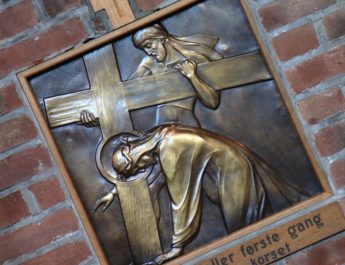Psalm 145:8-14
Proper 9A
8 The LordA is graciousB and merciful,C
A “Lord” = YHVH. From havah (to be, become) or hayah (to come to pass, become, be). This is the name of the God of Israel, the self-existent and eternal one, the tetragrammaton. This pronunciation has been lost to time so “Lord” is generally used in its place.
B “gracious” = channun. 13x in OT. From chanan (beseech, show favor, be gracious; properly, to bend in kindness to someone with less status). This is gracious, compassionate, merciful, having pity on.
C “merciful” = rachum. 13x in OT. From the same as rechem (womb); from racham (to love, have compassion, have mercy); from racham (compassion, tender love, womb, compassion; the womb as that which cherishes the fetus). This is compassionate or merciful.
slowD to angerE and aboundingF in steadfast love.G
D “slow” = arek. 15x in OT. From arak (to be long in a literal or figurative sense, to continue, defer, draw out, endure, delay). This is long, patience, or slow.
E “anger” = aph. From anaph (to be angry; properly, breathing hard as a signifier of being enraged). This properly refers to the nose or nostril and by extension the face. It can specifically refer to anger or wrath as one breathes hard and nostrils flare in times of great anger.
F “abounding” = gadol. From gadal (to grow up, become great, become wealthy – to advance. The root meaning may be to twist in the sense of the process of growing). This is great, high, bigger, noble, old, marvelous. It can also refer to someone who is powerful or distinguished.
G “steadfast love” = chesed. From chasad (being good, kind, merciful; may mean bowing one’s neck as is done in the presence of an equal for courtesy’s sake; so, if one in a superior position is treating you like an equal, that is what is captured here). This is favor, goodness, kindness, loving kindness, pity, reproach, or a good deed. When done by God to humanity, this is mercy/loving kindness. When done by humanity to God, it is piety.
9 The Lord is goodH to all,I
and his compassionJ is over all that he has made.K
H “good” = tob. From tob (to be pleasing, to be good). This is good, beautiful, pleasant, agreeable, bountiful, at ease. This word is used for goodness as a concept, a good thing, a good person. This can refer to prosperity and welfare as well as joy, kindness, sweetness, and graciousness. So, this is ethically good, but also enjoyably good.
I “all” = kol. From kalal (to complete). This is all or every.
J “compassion” = racham. Related to “merciful” in v8. From the same as rechem (see note C above). This is compassion, mercy, or tender love.
K “made” = maaseh. From asah (to do, make, accomplish, become). This is a word – any action whether positive or negative. It can also be a transaction, construction, activity, property, or something that is produced.
10 All your worksL shall give thanksM to you, O Lord,
and all your faithfulN shall blessO you.
L “works” = maaseh. Same as “made” in v9. See note K above.
M “give thanks” = yadah. From yad (hand). This is to throw one’s hands into the air in a gesture of praise. So, it is to praise, give thanks, or make a confession.
N “faithful” = chasid. Related to “steadfast love” in v8. From chasad (see note G above). This is faithful, kind, pious, merciful, or gracious. It can also refer to godly or pious people. This is where Chasidic Jews take their name from.
O “bless” = barak. This is to kneel, to bless. It is blessing God as part of worship and adoration or blessing humans to help them. It can be used as a euphemism to say curse God.
11 They shall speak of the gloryP of your kingdom,Q
and tellR of your power,S
P “glory” = kabod. From kabad (to be heavy, weighty, burdensome). This is weighty. Figuratively, glorious, abundant, riches, honor, splendor – a reference to one’s reputation or character. This word is often used to describe God and God’s presence.
Q “kingdom” = malkut. From melek (king, royal). This is royalty, kingdom, realm, empire – the power the sovereign has.
R “tell” = dabar. This is generally to speak, answer, declare, or command. It might mean to arrange and so to speak in a figurative sense as arranging words.
S “power” = geburah. From gabar (to be strong or mighty; to prevail or be insolent). This is force in a literal or figurative sense. So, it could be strength, power, courage, triumph, victory, or mastery.
12 to make knownT to all peopleU your mighty deeds,V
and the gloriousW splendorX of your kingdom.
T “make known” = yada. This is to know, acknowledge, advise, answer, be aware, be acquainted with. Properly, this is to figure something out by seeing. It includes ideas of observation, recognition, and care about something. It can be used causatively for instruction, designation, and punishment.
U “people” = ben + adam. Literally, “children of humanity.” Ben is from banah (to build or obtain children). This is son, age, child. It is son in a literal or figurative sense. Adam is perhaps from adam (to be red, make ruddy); related to adamah (ground, dirt, earth). This is man, humankind, also Adam’s name. It refers to a human individual or humanity.
V “mighty deeds” = geburah. Same as “power” in v11. See note S above.
W “glorious” = kabod. Same as “glory” in v11. See note P above.
X “splendor” = hadar. From hadar (to honor or adorn; majestic, respected, glorious; to favor or honor; to be proud). This is ornament, splendor, beauty, dignity, majesty, magnificence, and glory.
13 Your kingdom is anY everlastingZ kingdom,
and your dominionAA endures throughout all generations.BB
The Lord is faithful in all his words,
and gracious in all his deeds.
Y {untranslated} = kol. Same as “all” in v9. See note I above.
Z “everlasting” = olam. This is a long scope of time whether in the past (antiquity, ancient time) or in the future (eternal, everlasting).
AA “dominion” = memshalah. 14x in OT. From mimshal (dominion, ruler, authority); from mashal (to rule, reign, govern, have authority, wield). This is to rule, govern, a ream, ruler, authority, dominion, forces.
BB “generations” = dor + dor. Literally, “generation and generation.” From dur (to move in a circle, which implies living somewhere or remaining there; it can also be the sense of piling or heaping up). This is a revolution of time, which is to say, an age or generation. It can also be a dwelling or one’s posterity.
14 The Lord upholdsCC all who are falling,DD
and raises upEE all who are bowed down.FF
CC “upholds” = samak. This is to lean, rest, support, brace, uphold, sustain, or establish. It is to lean on in a positive or negative sense.
DD “falling” = naphal. This is to fall, whether by accident, to fall prostrate, or to fall in violent death. Figuratively, it can refer to personal ruin or calamity, a city falling, an attack or a falling away. It can also be a deep sleep or wasting away.
EE “raises up” = zaqaph. 2x in OT. This is to raise or lift up. Figuratively, it can mean to comfort.
FF “bowed down” = kaphaph. 5x in OT. This is to bend, bow, or curve. It is used for bowed down (as in oppressed), a bulrush bowing, and bowing before God.
Image credit: “Morning Light v3” by Hannes Flo, 2016.




